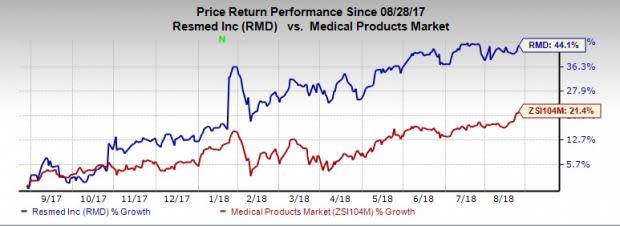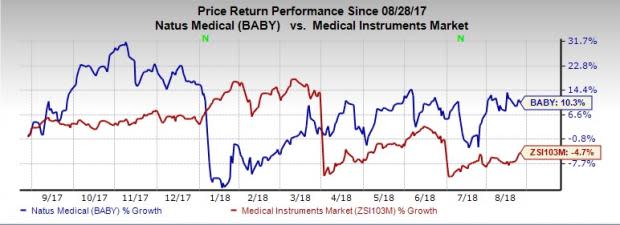Tap the Sleep Apnea Devices Market Boom With These 3 Stocks
Favorable consumer behavior, growing demand for liquid biopsy tests along with deferred implementation of an industry-wide Medical Device tax have created a safe haven for medical device companies. As the U.S. Medical Device industry is likely to reach a worth of $173 billion by 2019, per Emergo, it is currently enjoying the investment world’s attention.
Among the subindustries within this space, sleep apnea devices market is the one beaming with prospects banking on growing geriatric population and rising health awareness.
Per the National Sleep Foundation, sleep apnea is a condition in which breathing is repeatedly and briefly interrupted during sleep. Going by an article published on The Sleep Zone, around 50-70 million U.S. adults suffer from sleep disorders with obstructive sleep apnea being the most common. Sleep apnea is observed in 3-7% of men and 2-5% of women.
Globally, the scenario is grave with over 100 million suffering from sleep apnea (per an article published on The Sleep Zone). The increasing incidence has driven demand for sleep apnea devices. Per a report by MarketsAndMarkets, the global sleep apnea devices market is expected to see a CAGR of 7.8% to reach $6.49 billion between 2018 and 2023.
Going by the same report, North America is projected to be the largest market for sleep apnea devices in 2018.
Thus, for investors keen on effective investments in longer-term gains, the cardiovascular devices market holds immense potential.
Factors Driving Sleep Apnea Devices Market
Rising healthcare expenditures, increasing obesity, unhealthy lifestyle practices along with expanded treatment options have been driving demand for sleep apnea devices. Per a Centers for Medicare and Medicaid Services report published by Advisory Board, U.S. healthcare spending is projected to rise to around $5.5 trillion by 2025, representing 19.9% of GDP (based on the assumption that the Affordable Care Act will continue through 2025).
The sleep apnea devices market is largely dependent on the aging population. Per the U.S. Census Bureau report, in 2050, people aged 65 or more are likely to total 83.7 million, almost double its estimated population of 43.1 million in 2012. Data also shows that the median age is increasing in most areas of the country and the global scenario is pretty similar.
Strengthening emerging markets have been contributing largely to the rise in demand for sleep apnea devices. Per an article by Grand View Research, the Asia-Pacific market for sleep apnea devices is expected to see a CAGR of 8.8% between 2012 and 2022. The market is being fueled by introduction of budget devices to cater to the needs of price sensitive customers in Asia Pacific, increasing awareness, growing population and rising healthcare expenditure.
Moreover, a strong correlation between obstructive sleep apnea and a number of cardiovascular diseases has been discovered recently. Going by a The Sleep Zone article, obstructive sleep apnea expands the risk of heart failure by 140%, stroke by 60% and coronary heart diseases by 30%. This has led to enhanced opportunities for sleep apnea device makers.
AI Touches Sleep Apnea Devices Market
Cognitive Artificial Intelligence (AI) has been transforming the way sleep apnea is managed across the world. Hi-tech medical devices and analytical predictive-diagnostics tools are helping create customized programs that support sleep management.
In this regard, researchers at Massachusetts Institute of Technology and Massachusetts General Hospital — including professors of engineering and computer science along with the chief of the hospital’s Division of Sleep Medicine — came together to design, develop and test the new technology made using AI algorithms (per an article published on VB). With an 80% success rate in effectively measuring sleep stages, this wireless device will help better study the sleep apnea condition.
If this was not enough, DeepHeart, an AI for cardiac health, is using data from consumer wearable devices like Apple Watch, Android Wear, Garmin and Fitbit to discover conditions like sleep apnea and hypertension (per an AI News article). Moreover, it performs with an impressive accuracy of around 90% for detecting sleep apnea conditions.
3 Stocks to Watch Out For
We have picked three companies which can tap the promising prospects of the sleep apnea devices market.
Masimo Corporation MASI: This Zacks Rank #2 (Buy) company develops, manufactures and markets a family of non-invasive monitoring systems. The company has two segments: Product Revenues, Royalty & Other revenues. You can see the complete list of today’s Zacks #1 Rank (Strong Buy) stocks here.
The company recently announced that its SET Measure-through Motion and Low Perfusion pulse oximetry might be a useful initial screening method to identify children with Down Syndrome who are at a high risk of obstructive sleep apnea.
Notably, the screening method might replace multichannel sleep studies, which are expensive and also available at specialist centers. For investors’ notice, in the recently-reported second quarter of 2018, Masimo shipped a whopping 58,700 oximeters and brain function monitors, which drove overall earnings.
Masimo has an expected earnings growth rate of 15% for the next three to five years.
Over the past year, Masimo has outperformed its industry. The stock has gained 43.4% against the industry’s 4.6% decline.

ResMed Inc. RMD: This Zacks Rank #3 (Hold) company holds a major position as a designer, manufacturer as well as a distributor in the worldwide market for generators, masks and related accessories for the treatment of sleep-disordered breathing and other respiratory disorders. SDB includes obstructive sleep apnea and other respiratory disorders that occur during sleep.
At present, the company’s portfolio of products includes airflow generators, diagnostic products, mask systems, headgear and other accessories. The company is also focusing on product development and innovation. In this regard, ResMed is encouraged with the positive feedback pertaining to the QuietAir technology, which is part of the AirFit F20 full face mask.
ResMed has an expected earnings growth rate of 11% for the next three to five years.
Over the past year, ResMed has outperformed its industry. The stock has gained 44.1% compared with the industry’s 21.4% gain.

Natus Medical Incorporated BABY: This Zacks Rank #3 (Hold) company provides medical equipment, software, supplies and services for the identification, monitoring, and treatment of impairments and disorders affecting the brain, newborns, nerves, muscles, balance, mobility and hearing.
The company’s Neuro business unit offers a comprehensive portfolio of sleep solutions. It includes in-lab testing products like Natus SleepWorks Software, Xltek Brain Monitor Amplifier, etc. The portfolio also comprises out-of-center sleep testing products.
Over the past year, Natus has outperformed its industry. The stock has gained 10.3% against the industry’s 4.7% decline.

Wall Street’s Next Amazon
Zacks EVP Kevin Matras believes this familiar stock has only just begun its climb to become one of the greatest investments of all time. It’s a once-in-a-generation opportunity to invest in pure genius.
Click for details >>
Want the latest recommendations from Zacks Investment Research? Today, you can download 7 Best Stocks for the Next 30 Days. Click to get this free report
Masimo Corporation (MASI) : Free Stock Analysis Report
Natus Medical Incorporated (BABY) : Free Stock Analysis Report
ResMed Inc. (RMD) : Free Stock Analysis Report
To read this article on Zacks.com click here.

 Yahoo Finance
Yahoo Finance 
